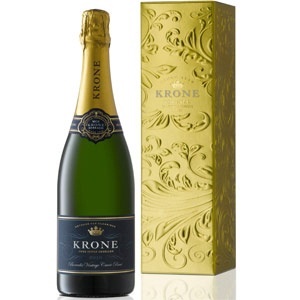A news item from Die Burger today reveals that one of South Africa’s best-loved bubblies is not all it purports to be. Krone Borealis is a long-established brand of MCC (Methode Cap Classique) which was owned by the Krone family. In 2012, the brand was bought by Vinimark, a large distribution company which also makes various wines under its own labels. In buying the brand, they also bought the existing stock and this is when they discovered a problem with the strength of the bottles on the 2010 vintage – they were too flimsy to withstand the enormous pressure from the bubbles inside and were thus exploding. In an effort to rectify this, they decanted the wine out into a pressurised tank and re-bottled it in stronger bottles.
As far as this goes, this is a perfectly acceptable method of making sparkling wine, one widely-used in Australia and the US. However, it isn’t used much in SA and perhaps because of this, a confusion has arisen as to whether this kind of bottle-fermentation is sufficient to label the wine as an MCC.
A Methode Cap Classique wine is made in the same way as Champagne and all the best sparkling wines of the world with a second fermentation taking place in the exact bottle which ends up on the customer’s table. This method involves a lot of time-consuming and expensive techniques which is why MCC is generally more expensive than other types of sparkling wine. It is also why MCC and champagne is so prized, because the method preserves the unique autolytic flavours and quality of the bubbles better than any other method of making sparkling wine.
In what is generally called the ‘transfer method’ a second fermentation also takes place in the bottle but instead of the wine then undergoing a lengthy riddling process followed by individual disgorging, the bottles are opened up into a pressurised tank where the dead yeast cells (lees) are then filtered out before the wine is re-packaged (still under pressure) into a clean, new bottle (In this case, there has been no filtration, just re-bottling).It’s a good method of making sparkling wine and preserves much of the flavour and carbonation, but it’s obviously cheaper to make than an MCC.
And this is the problem. If Vinimark did this to prevent bottles exploding in customer’s faces (and I’m sure we’re all glad that this didn’t happen!) then this is a perfectly legitimate exercise and actually has cost them more, since they have effectively had to repeat some of the stages of production. But it isn’t an MCC and I can understand the Cap Classique Association being so upset at it being labelled as such.
So much confusion already exists in consumer’s minds as to what is and what isn’t an MCC – many people call the stuff ‘champagne’ half the time which isn’t correct, and the other half of the time they lament that it costs so much more than a carbonated fizz without properly understanding the implications of the different styles. MCC is a growing brand both locally and internationally – we are the only New World country to have a name for this style of wine and in my opinion, it is this which is helping us to gain market share and awareness.
At the moment, the Krone Borealis 2010 is being sold with a different label, one which doesn’t say MCC. But the corks are still stamped with the words ‘Cap Classique’, the label still claims the wine to be ‘handcrafted’ and I think these things are problematic. Whilst I have every sympathy with Vinimark as they try and rescue a difficult situation, they are doing their own brand and, more importantly, brand ‘Methode Cap Classique’ no good at all by adding even further to the confusion.
Pieter Ferreira, chairman of the Cap Classique Association agrees. “We’ve worked so hard to establish MCC in the minds of the consumer, and now this short-cut, quick-fix has the potential to undermine all that work.” He says that the Association will be making representations to the Wine & Spirit Board about this matter and hopes it can be resolved, not just in this instance, but also going forward. “The term ‘bottle-fermented sparkling wine’ to most people means MCC and perhaps this is a wake-up call to the Association to make sure this will always remain the case.”
Follow @CathyMarston on twitter for more wine news.

